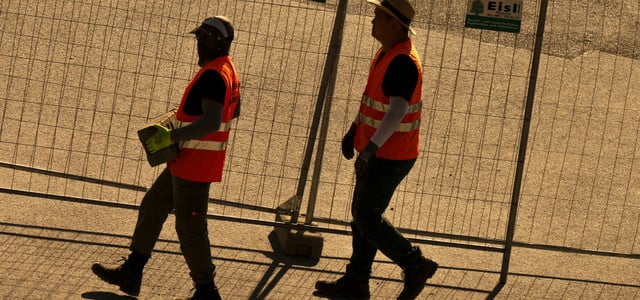
In high heat we sweat, sleep badly and feel tired. But high temperatures can also have more serious consequences for body and psyche. An overview of what happens in the body in heat – and how we can protect ourselves.
Up to 38 degrees in the shadow are predicted in parts of Germany, there are local weather warnings in front of great heat. For some people, the temperatures can have life -threatening consequences. With increasing global warming, such heat waves become more and more intense – and the risks greater.
Because heat has an impact on health: sweat beads on the forehead, water in the legs or a rumbling heart – the body reacts. But what exactly happens? When does heat become dangerous? And how can you protect yourself?
Contents:
- What happens in the body in the heat?
- How do you recognize that heat becomes dangerous?
- Is heat really fatal?
- Does heat make us more aggressive?
- Who is particularly at risk in heat?
- How do you protect the body from heat?
What happens in the body in the heat?
37 degrees – the human body usually has this core temperature. Then most cells, proteins and the immune system work optimally. But external influences such as heat and cold can affect body temperature.
A rule of thumb: it becomes dangerous if the body absorbs more heat under certain conditions than it can release again. Because then the body temperature gets out of control and rises quickly. This limit is very individual and is related to age, state of health, activity and getting used to.
So that we do not overheat, we use different mechanisms of cooling. “At less high temperatures, heat loss due to radiation and convection plays a major role,” says Ralf Brandes. He is General Secretary of the German Physiological Society (DPG) and Professor of Physiology at the Goethe University Frankfurt/Main. Body heat is released to the environment via electromagnetic waves or “blown away” by the body.
The warmer the ambient air, the less effective these mechanisms are. Then you sweat. The human body can lose up to two liters of sweat per hour, says Nadine Lenz. She is the coordinator of the Climate Change and Health project group in the Federal Institute for Public Health (BIÖG).
When sweating, evaporation cold arises, it regulates the temperature. In order to keep the body temperature consistently low, warm blood is also brought into the extremities from the center. Hands, feet and face are thus more supplied with blood, “whereby more water is often pressed into the tissue,” says Ralf Brandes. The result can be thick feet or fingers.

By the way: you can learn sweating. According to Ralf Brandes, if you do sports regularly, you can train sweating and thus optimize the warmer regulation of the body.
However, it sweats worse on sultry days, because air humidity also plays a role. “If the air is already strongly saturated with water, sweating no longer works well,” says Ralf Brandes. Instead of evaporating, the moisture gets stuck in the clothing. Then often only the withdrawal to the most cool room as possible helps.
How do you recognize that heat becomes dangerous?
If the body’s sweat capacity reaches borders, the heat build-up comes: the body temperature rises quickly-often within 10 to 15 minutes-to over 40 degrees or more.
According to Nadine Lenz, dizziness, headache, exhaustion or drowsiness are typical symptoms for too high heat load. Strong blower or blush, nausea, shortness of breath, restlessness or muscle pain can also be seen as a warning signal in connection with heat.
Many of these symptoms are related to the loss of fluid that arises when sweating. “If I don’t drink sufficiently, it means that my blood becomes increasingly concentrated,” says Ralf Brandes. In the worst case, it goes so far that blood pressure drops and the blood cells begin to attach each other.
“That would be a very threatening situation that would be a heat stroke,” says the doctor. He therefore recommends paying attention to whether you get thirsty. This is usually one of the first reactions of the body to great heat. However, some people do not get a thirst of thirst, for example because of medication. Or small children cannot articulate it.
“You can tell an impending dehydration from the fact that the mouth becomes dry, the heart beats very quickly and the skin feels very dry and warm,” says Brandes.
According to the German Society for Neurology (DGN), heat also increases the risk of neurological diseases. A study of German neurologists published in the “European Heart Journal” concludes that due to increasing heat, the risk of stroke has increased significantly due to increasing heat.
Heat becomes life -threatening when the body temperature increases above 42 degrees. Incidentally, a heat load does not necessarily have to go hand in hand with direct sunlight. “That can also happen in the sauna,” says the professor.
Is heat really fatal?
In the years 2023 and 2024, according to the Federal Environmental Office and the Robert Koch Institute, around 3,000 people died due to heat-especially people over the age of 75 with previous illnesses such as dementia, cardiovascular or lung diseases.
If it stays hot for several days in a row, without cooling at night, the mortality rate continues to rise to the Federal Environment Agency and reaches a equally high level after about three to four days.
If the temperatures do not fall below 20 degrees even at night, one speaks of tropical nights. Because the body cannot recover sufficiently from the heat, sleep disorders are often the result – and which in turn can have psychological and mental consequences.
Does heat make us more aggressive?
A Japanese-South Korean study-published in the Yale Journal of Biology and Medicine-comes to the conclusion that the risk of deaths increases by 1.4 percent per degree increase in the ambient temperature.
The number of aggressive incidents increases, so there are also more emergency rooms in acute psychiatry. According to the German Society for Psychiatry and Psychotherapy, Psychosomatics and Nerve Healing (DGPPN), the number of suicides even increases.
Sebastian Karl, doctor at the Central Institute for Mental Health in Mannheim and co -author of a position paper from the DGPPN, emphasizes: “” Iele people have already experienced in their own body that they feel worse, that they are worse or that they are worse or that it is worse if it is really hot: Heat hits the psyche. When the temperatures rise, the risk of psychological diseases increases per grades by 0.9 percent. “
Who is particularly at risk in heat?
-
People with diseases: Since the heat particularly affects the blood circulation, heart -sick people are particularly at risk. Certain drugs that are prescribed in the context of mental or neurological therapies could also influence sweating, says Brandes. On the other hand, demented patients may have difficulty expressing their feeling of heat and taking appropriate countermeasures.
-
Children: “The welding production in small children is lower, but their metabolic rate is higher than in adults,” says Nadine Lenz. “In addition, the skin surface of children is large in relation to body weight – they therefore need more time than adults to adapt to heat.” However, even if small children cannot clearly say if they are too warm.
-
Old people: Heat is particularly stressful for people aged 65 and over. “Your body is no longer so easy to adapt to high temperatures,” says Nadine Lenz. “They sweat later and less because the number of sweat glands and the blood flow to the skin decreases in old age.” The feeling of thirst is also less pronounced in old age.
How do you protect the body from heat?
To counter the heat, the body needs liquid. But you should not only add enough on hot days. After all, the body not only loses water, but also salts. This is about 9 grams per liter of body water.
Mineral water and the like usually contain less than 1 gram of salts per liter, so it is not enough to refill sufficient. Anyone who feels salt hunger due to the sweating should give in to them calmly, advises Brandes. Also sensible: sometimes to use isotonic drinks, since they additionally supplied the body with salt – “unfortunately also sugar,” says Brandes.
Incidentally, alcohol is a bad choice as a thirst quencher on hot days. The reason: “Alcohol deprives the body further water and valuable minerals,” says Nadine Lenz. The body is drained and run the risk of drying out.
What is still important to get well through hot days? “Shower better lukewarm than cold to protect the circulation,” advises Nadine Lenz. To cool down the body, water sprays, moist envelopes or a cool foot bath can also be used. If possible, physical activities should be moved to the cooler morning or evening hours and the apartment should also be kept as cool as possible.
“Consult your doctor to have the medicines taken for heat tolerance if necessary and ensure sun protection if you go outdoors,” says Nadine Lenz. According to Ralf Brandes, bright and airy clothing primarily protects against radiation heat.
Read more on utopia.de:
- What to do in heat? 5 tips from southern Europe
- Cooling apartment without air conditioning: The best tips
- “The summer used to be hot” – Klima_argument in fact check
** marked with ** or orange underlined Links to sources of supply are partially partner links: If you buy here, you will actively support Techzle\.com, because we will then receive a small part of the sales proceeds. More information.